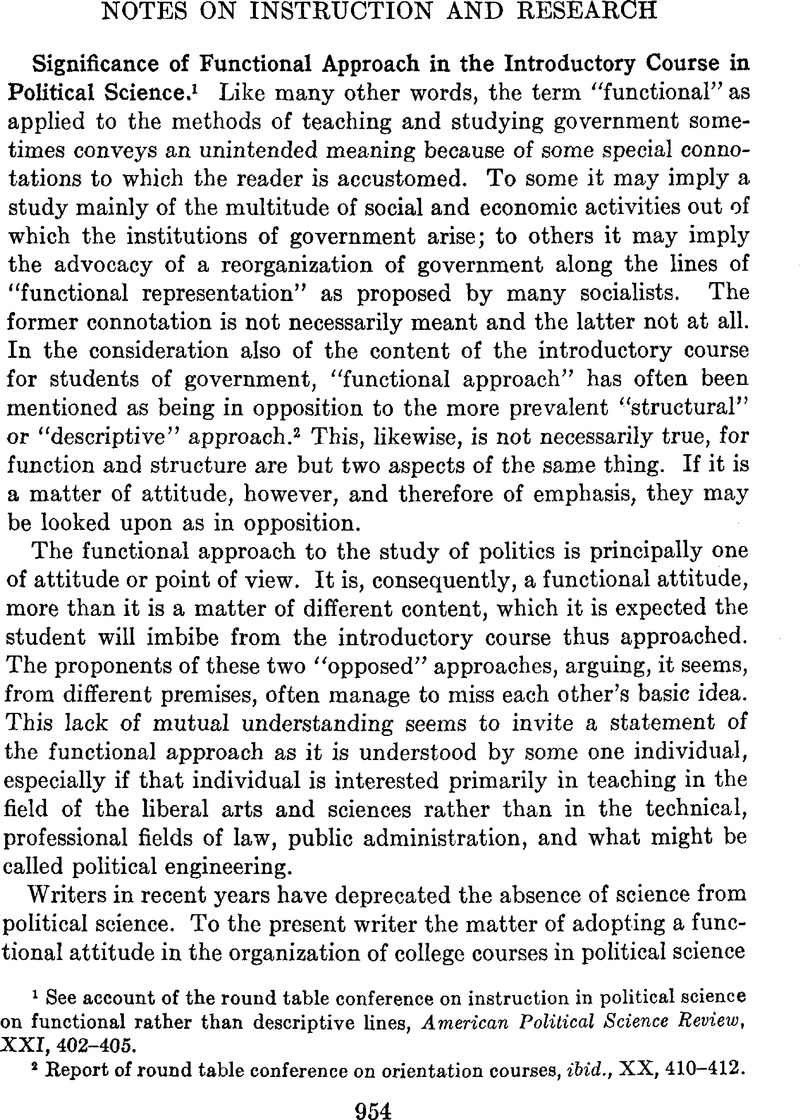Article contents
Significance of Functional Approach in the Introductory Course in Political Science1
Published online by Cambridge University Press: 01 August 2014
Abstract

- Type
- Notes on Instruction and Research
- Information
- Copyright
- Copyright © American Political Science Association 1928
Footnotes
See account of the round table conference on instruction in political science on functional rather than descriptive lines, American Political Science Review, XXI, 402–405.
References
2 Report of round table conference on orientation courses, ibid., XX, 410–412.
3 Catlin, G. E. G., Science and Method of Politics, 6–7Google Scholar.
4 A view compatible with that expressed so well by J. H. Robinson in his The Mind in the Making seems desirable.
5 This is stated amusingly by Lippmann, Walter in The Phantom Public, 32Google Scholar.
6 H. J. Laski, possibly borrowing freely from Duguit, puts it so strongly as to say that government is a great public service corporation, though that term connotes a legalistic concept. Grammar of Politics, 69–70.
7 It is for this reason that the study of government is here looked upon as a branch of sociology, in the broadest use of that term. Cf. Willoughby, and Rogers, , Introduction to the Problem of Government, 1Google Scholar.
8 This is put quite forcibly by Laski, in his Grammar of Politics, 17Google Scholar.
9 In Guild Socialism.
10 In A Constitution for the Socialist Commonwealth of Great Britain.
11 There might be a most expedient procedure under given conditions, but this would be a matter of applied politics and not of political science.
12 Lippmann, Walter, A Preface to Politics, 1–3Google Scholar.
13 Cf. Gray, John Chipman, The Nature and Sources of the Law (2nd ed.), Ch. IV, and pp. 308–309Google Scholar. M. Duguit states the relation between social function and law thus: “This idea of a social function which both statesmen and political theorists are beginning to place, as they perceive it, at the very root of public law is no more than the idea of public service.” Law in the Modern State, 39. Cf. also Pound, Roscoe, Introduction to the Philosophy of Law, 97–98Google Scholar.
14 This, it would seem, need not necessarily apply to the teacher of practical, professional courses, such as in public administration.
15 The embarrassing disagreements, mentioned by Professor Merriam, among “prudents, the professional students of government, and political savants,” in their discussions may perhaps be due in part to such an attempted double rôle—mentally, if not actually. New Aspects of Politics, 165. The incompatibility of political action and political investigation need not necessarily prevent the political scientist from making practical suggestions as a matter of present expediency, or political prudence, as Professor Merriam calls it, provided he takes no part in its adoption and fully recognizes that it can be nothing more than a suggestion for experimentation, and that it may or may not work.
16 New Aspects of Politics, 217.
17 One rather serious pedagogical difficulty with the descriptive course is that it is susceptible to only a slight gradation in intellectual difficulty for advanced students. While the more difficult courses usually require memorizing of a greater amount of structural and legal description, too often the student is not required to demonstrate any increased power of detecting significant processes and relationships.
18 Allport, F. H., “The Psychological Nature of Political Structure,” American Political Science Review, XXI, 612–614Google Scholar.
19 Cf. J. C. Gray, Nature and Sources of the Law, Ch. IV.
20 Cf. B. N. Cardozo, The Nature of the Judicial Process, Lect. IV.
- 3
- Cited by





Comments
No Comments have been published for this article.